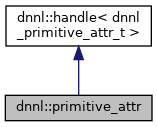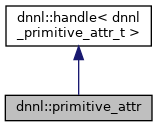Primitive attributes. More...
#include <dnnl.hpp>


Public Member Functions | |
| primitive_attr () | |
| Constructs default (empty) primitive attributes. | |
| primitive_attr (dnnl_primitive_attr_t attr) | |
| Creates primitive attributes from a C API dnnl_primitive_attr_t handle. More... | |
| scratchpad_mode | get_scratchpad_mode () const |
| Returns the scratchpad mode. | |
| void | set_scratchpad_mode (scratchpad_mode mode) |
| Sets scratchpad mode. More... | |
| void | get_output_scales (int &mask, std::vector< float > &scales) const |
| Returns output scaling factors correspondence mask and values. More... | |
| void | set_output_scales (int mask, const std::vector< float > &scales) |
| Sets output scaling factors correspondence mask and values. More... | |
| void | get_scales (int arg, int &mask, std::vector< float > &scales) const |
| Returns scaling factors correspondence mask and values for a given memory argument. More... | |
| void | set_scales (int arg, int mask, const std::vector< float > &scales) |
| Sets scaling factors for primitive operations for a given memory argument. More... | |
| void | get_zero_points (int arg, int &mask, std::vector< int32_t > &zero_points) const |
| Returns zero points correspondence mask and values. More... | |
| void | set_zero_points (int arg, int mask, const std::vector< int32_t > &zero_points) |
| Sets zero points for primitive operations for a given memory argument. More... | |
| const post_ops | get_post_ops () const |
| Returns post-ops previously set via set_post_ops(). More... | |
| void | set_post_ops (const post_ops ops) |
| Sets post-ops. More... | |
| void | set_rnn_data_qparams (float scale, float shift) |
| Sets quantization scale and shift parameters for RNN data tensors. More... | |
| void | set_rnn_weights_qparams (int mask, const std::vector< float > &scales) |
| Sets quantization scaling factors for RNN weights tensors. More... | |
 Public Member Functions inherited from dnnl::handle< dnnl_primitive_attr_t > Public Member Functions inherited from dnnl::handle< dnnl_primitive_attr_t > | |
| bool | operator== (const handle< dnnl_primitive_attr_t, handle_traits< dnnl_primitive_attr_t > > &other) const |
| Equality operator. More... | |
| bool | operator!= (const handle &other) const |
| Inequality operator. More... | |
| handle ()=default | |
| Constructs an empty handle object. More... | |
| handle (const handle< dnnl_primitive_attr_t, handle_traits< dnnl_primitive_attr_t > > &)=default | |
| Copy constructor. | |
| handle (handle< dnnl_primitive_attr_t, handle_traits< dnnl_primitive_attr_t > > &&)=default | |
| Move constructor. | |
| handle (dnnl_primitive_attr_t t, bool weak=false) | |
| Constructs a handle wrapper object from a C API handle. More... | |
| handle< dnnl_primitive_attr_t, handle_traits< dnnl_primitive_attr_t > > & | operator= (const handle< dnnl_primitive_attr_t, handle_traits< dnnl_primitive_attr_t > > &)=default |
| Assignment operator. | |
| handle< dnnl_primitive_attr_t, handle_traits< dnnl_primitive_attr_t > > & | operator= (handle< dnnl_primitive_attr_t, handle_traits< dnnl_primitive_attr_t > > &&)=default |
| Move assignment operator. | |
| void | reset (dnnl_primitive_attr_t t, bool weak=false) |
| Resets the handle wrapper objects to wrap a new C API handle. More... | |
| dnnl_primitive_attr_t | get (bool allow_empty=false) const |
| Returns the underlying C API handle. More... | |
| operator dnnl_primitive_attr_t () const | |
| Converts a handle to the underlying C API handle type. More... | |
| operator bool () const | |
| Checks whether the object is empty. More... | |
Detailed Description
Primitive attributes.
- See also
- Primitive Attributes
Constructor & Destructor Documentation
◆ primitive_attr()
|
inline |
Creates primitive attributes from a C API dnnl_primitive_attr_t handle.
The resulting handle is not weak and the C handle will be destroyed during the destruction of the C++ object.
- Parameters
-
attr The C API primitive attributes.
Member Function Documentation
◆ set_scratchpad_mode()
|
inline |
Sets scratchpad mode.
- Parameters
-
mode Specified scratchpad mode.
◆ get_output_scales()
|
inline |
Returns output scaling factors correspondence mask and values.
- Parameters
-
mask Scaling factors correspondence mask that defines the correspondence between the output tensor dimensions and the scalesvector. The set i-th bit indicates that a dedicated output scaling factor is used for each index along that dimension. The mask value of 0 implies a common output scaling factor for the whole output tensor.scales Vector of output scaling factors.
◆ set_output_scales()
|
inline |
Sets output scaling factors correspondence mask and values.
- Note
- The order of dimensions does not depend on how elements are laid out in memory. For example:
- for a 2D CNN activations tensor the order is always (n, c)
- for a 4D CNN activations tensor the order is always (n, c, h, w)
- for a 5D CNN weights tensor the order is always (g, oc, ic, kh, kw)
Example usage:
- Parameters
-
mask Defines the correspondence between the output tensor dimensions and the scalesvector. The set i-th bit indicates that a dedicated scaling factor is used for each index along that dimension. Set the mask to 0 to use a common output scaling factor for the whole output tensor.scales Constant vector of output scaling factors. If the scaling factors are known at the time of this call, the following equality must hold: \[scales.size() = \prod\limits_{d \in mask} output.dims[d].\]
Violations can only be detected when the attributes are used to create a primitive descriptor. If the scaling factors are not known at the time of the call, this vector must contain a single DNNL_RUNTIME_F32_VAL value and the output scaling factors must be passed at execution time as an argument with index DNNL_ARG_ATTR_OUTPUT_SCALES.
◆ get_scales()
|
inline |
Returns scaling factors correspondence mask and values for a given memory argument.
- Parameters
-
arg Parameter argument index as passed to the primitive::execute() call. mask Scaling factors correspondence mask that defines the correspondence between the output tensor dimensions and the scalesvector. The set i-th bit indicates that a dedicated scaling factor is used for each index along that dimension. Set the mask to 0 to use a common scaling factor for the whole output tensor.scales Output vector of scaling factors.
◆ set_scales()
|
inline |
Sets scaling factors for primitive operations for a given memory argument.
- Parameters
-
arg Parameter argument index as passed to the primitive::execute() call. mask Scaling factors correspondence mask that defines the correspondence between the tensor dimensions and the scalesvector. The set i-th bit indicates that a dedicated scaling factor is used for each index along that dimension. Set the mask to 0 to use a common scaling factor for the whole output tensor.scales Constant vector of scaling factors. The following equality must hold: \[scales.size() = \prod\limits_{d \in mask} argument.dims[d].\]
◆ get_zero_points()
|
inline |
Returns zero points correspondence mask and values.
- Parameters
-
arg Parameter argument index as passed to the primitive::execute() call. mask Zero points correspondence mask that defines the correspondence between the output tensor dimensions and the zero_pointsvector. The set i-th bit indicates that a dedicated zero point is used for each index along that dimension. Set the mask to 0 to use a common zero point for the whole output tensor.zero_points Output vector of zero points.
◆ set_zero_points()
|
inline |
Sets zero points for primitive operations for a given memory argument.
- Parameters
-
arg Parameter argument index as passed to the primitive::execute() call. mask Zero point correspondence mask that defines the correspondence between the tensor dimensions and the zero_pointsvector. The set i-th bit indicates that a dedicated zero point is used for each index along that dimension. Set the mask to 0 to use a common zero point for the whole output tensor.zero_points Constant vector of zero points. If the zero points are known at the time of this call, the following equality must hold: \[zero_points.size() = \prod\limits_{d \in mask} argument.dims[d].\]
If the zero points are not known at the time of the call, this vector must contain a single DNNL_RUNTIME_F32_VAL value and the zero points must be passed at execution time as an argument with index DNNL_ARG_ATTR_ZERO_POINTS.
- Examples:
- cpu_matmul_quantization.cpp.
◆ get_post_ops()
|
inline |
Returns post-ops previously set via set_post_ops().
- Returns
- Post-ops.
◆ set_post_ops()
|
inline |
Sets post-ops.
- Note
- There is no way to check whether the post-ops would be supported by the target primitive. Any error will be reported by the respective primitive descriptor constructor.
- Parameters
-
ops Post-ops object to copy post-ops from.
- Examples:
- cnn_inference_int8.cpp, cpu_sgemm_and_matmul.cpp, and performance_profiling.cpp.
◆ set_rnn_data_qparams()
|
inline |
Sets quantization scale and shift parameters for RNN data tensors.
For performance reasons, the low-precision configuration of the RNN primitives expect input activations to have the unsigned 8-bit integer data type. The scale and shift parameters are used to quantize floating-point data to unsigned integer and must be passed to the RNN primitive using attributes.
The quantization formula is scale * (data + shift).
- Note
- Quantization scale and shift are common for src_layer, src_iter, dst_iter, and dst_layer.
Example usage:
- Parameters
-
scale The value to scale the data by. shift The value to shift the data by.
- Examples:
- cpu_rnn_inference_int8.cpp.
◆ set_rnn_weights_qparams()
|
inline |
Sets quantization scaling factors for RNN weights tensors.
The low-precision configuration of the RNN primitives expect input weights to use the signed 8-bit integer data type. The scaling factors are used to quantize floating-point data to signed integer and must be passed to RNN primitives using attributes.
- Note
- The dimension order is always native and does not depend on the actual layout used. For example, five-dimensional weights always have (l, d, i, g, o) logical dimension ordering.
- Quantization scales are common for weights_layer and weights_iteration
- Parameters
-
mask Scaling factors correspondence mask that defines the correspondence between the output tensor dimensions and the scalesvector. The set i-th bit indicates that a dedicated scaling factor should be used each index along that dimension. Set the mask to 0 to use a common scaling factor for the whole output tensor.scales Constant vector of output scaling factors. The following equality must hold: \[scales.size() = \prod\limits_{d \in mask} weights.dims[d].\]
Violations can only be detected when the attributes are used to create a primitive descriptor.
- Examples:
- cpu_rnn_inference_int8.cpp.
The documentation for this struct was generated from the following file:
- include/dnnl.hpp